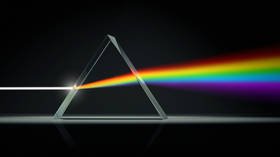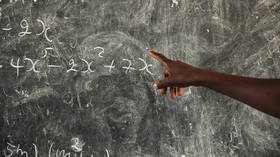Let there be light… so long as it’s decolonised. Right-on academics condemn the science of illumination as ‘white male dominated’

According to a new Canadian university project, physics is “a mirror of colonial patterns and social inequality,” particularly “in the context of light.” This is all not just baffling, but dangerously bonkers.
In the light of Black Lives Matter and the decision by Oriel College at Oxford University to move its statue of Sir Cecil Rhodes, the idea of “decolonising” education has made serious headway, with many institutions now reworking curricula to better reflect diversity and black and ethnic minority concerns.
There are plenty of problems with that outlook. It suggests that ethnic minority writers and thinkers should be included in college courses because of the colour of their skin, rather than the brilliance of their ideas. It also suggests that students can only really learn if education is “relevant” to them. After decades of fighting for equality, it seems we are now re-racialising society. Worse, this re-racialisation is seen as progressive.
But the idea of decolonising has gone further, suggesting that there are different systems of knowledge between cultures, and that these different “ways of knowing” are equivalent; that hey all deserve “respect,” rather than scepticism and testing. A new example of this is a project at Concordia University in Canada called Decolonizing Light. The project introduction explains:
“Even more than other sciences, physics is a white male dominated field and, thus, a mirror of colonial patterns and social inequality. Despite this fact, physics is considered as ‘hard’ and objective science, disconnected from social life and geopolitical history. This narrative both constitutes and reproduces inequality, which is reflected by the underrepresentation of women, racialized people, and Indigenous peoples in physics.”
There's nothing wrong with striving to ensure that institutional barriers don't get in the way of everyone – regardless of sex or ethnic background – being able to pursue study and a career in physics. But this project seems to go further, seeking to investigate “how colonial scientific knowledge authority was and is still reproduced in the context of light”. The researchers are exploring “Indigenous ontologies and epistemologies” and “studying colonial anchor points in the history of physics in the context of light.”
If you find this kind of language a bit baffling, you're not alone. Exploring ideas from different sources can certainly be valuable. But this project seems to be saying that these different forms of knowledge should be kept in silos, intellectually and morally equivalent to each other. If that is what is being suggested, it's an awful idea. (And if that's not what is being suggested, maybe an introductory course on writing in plain English would help.)
The enormous success of science, through the Renaissance to the Enlightenment and beyond, is grounded on the central principle that there is an objective world out there we can endeavour to understand. We'll never quite get there – there will always be new layers of understanding to be achieved.
For example, Newton's theories from the seventeenth century are brilliant, but they don't work at massive scale, as Einstein showed, nor do they work at the sub-atomic level, as we now know from the mind-bending work of quantum physicists. (As a leading light of quantum physics, Niels Bohr, memorably noted: “Anyone who is not shocked by quantum theory has not understood it.”)
How do we improve our understanding? Through rigorous observation and the constant questioning and development of theories to explain those observations. This is a universal and humanistic project that relentlessly questions what we consider to be the truth. Far from confirming power structures, this outlook is revolutionary. Far from being the product of authority, it is capable of undermining long-established authority.
Look at how Copernicus, Galileo and Darwin came to undermine religious teaching on the origins and central importance of humankind. It turned out that the Earth is just another lump of rock orbiting a star, and that humans – far from being fashioned from scratch by God – are simply the evolved descendants of apes. (None of which stopped some leading nineteenth-century thinkers having backward views about Africans, for example.)
The reality of science doesn't always live up to this ideal. The many successes of science have given it an authority that is then sometimes used to stifle debate. Just look at the way scepticism about some of the claims of climate-change science has been used to denounce those raising these objections as ‘deniers’. “The science says…” has become a way of demanding that a particular set of policies must be implemented and opponents must be ostracised. Within the scientific world, professors who have Nobel Prizes on their shelves often don't take kindly to upstarts trying to overturn their much-cherished theories.
Nonetheless, we can and should apply those universal principles of science. To give up on that historic project would be a serious mistake. While many different societies and cultures have insights into the world, the fact remains that science and technology, as they developed through the Enlightenment tradition, have liberated billions from need and from the vagaries of nature.
The key is to test ideas from other cultures and bring them into the scientific mainstream. “Indigenous” medicine, agriculture and even physics that are tested and found to be valuable stop being “indigenous” – they're just science, pure and simple. Equally, if those ideas are tested and found to be erroneous, they should be rejected. We don't need to be parochial about that, either. The West has produced plenty of wrong-headed ideas of its own – from homeopathy to the idea that 5G wireless networks cause Covid-19.
Every idea, whatever its source, should be rigorously tested and debated. As the old motto of London's Royal Society famously put it, “Nullius in verba” – essentially, “take no one's word for it.” This philosophy has served the world very well for centuries.
We should always strive for a single, universal and complete understanding of the world. We will never get there, but the aim is an entirely laudable one. We should never give in to the destruction of knowledge into myriad different “ways of knowing.”
The statements, views and opinions expressed in this column are solely those of the author and do not necessarily represent those of RT.















